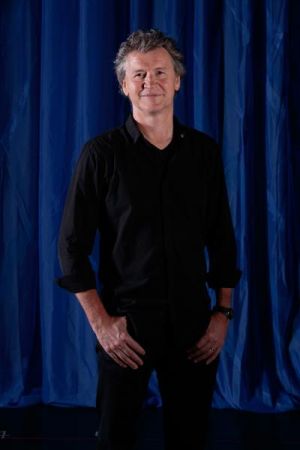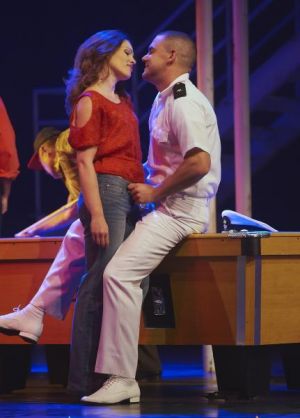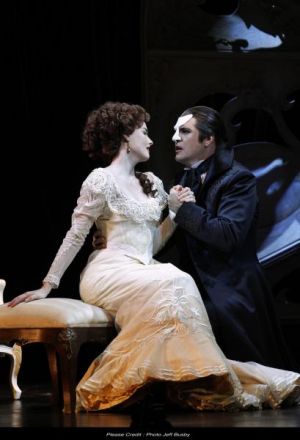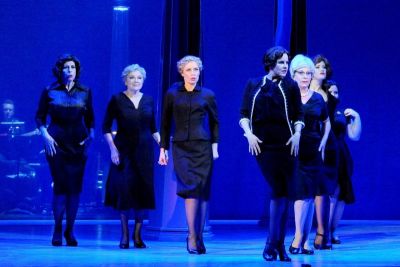Ready Please Mr Musicals
What is the secret to making a new hit musical? Simon Phillips, who directed Priscilla Queen of the Desert, Dream Lover – the Bobby Darin Musical, Ladies in Black, Love Never Dies, An Officer and a Gentleman, and will this year direct Muriel’s Wedding the Musical, believes he has finally worked out the recipe. He explained his thinking to a breakfast organised by Currency House.
I am surprised to find myself the current uber musical director in Australia because it’s really not anything I planned. I only did my first musical - Oliver! (in New Zealand) - because the person who was to direct it jumped ship at the last minute. In the process I became fascinated by the ingredients that make a musical work.
You have to find coherence between the musical elements, the choreographic elements and the scenic elements. Most are predicated on the fact that you can move very fluidly (in the case of Oliver! from Mr Brownlow’s study to the slums of Soho). There is a lot of scenic fluidity that is required, then there is the drama, so they all have to come together in particular way.
After the success of Oliver! I became Mr Musical in New Zealand for a bit. When I came to Australia, there were so many other Mr and Mrs Musicals that I stopped working in this area. Instead, working with writers of new plays became a fascinating area for me.

I found I could help develop the structure and rhythm of a new work to maximise its effectiveness. I could never in a million years contribute to the grist of writing, but sometimes writers with a brilliant talent for dialogue and plot can be less experienced in the kind of bricks and mortar that ultimately help the piece to realise its full potential. So I enjoy ‘mid-wifing’ new plays into life.
I don’t know what persuaded Nullarbor Productions (in the UK) to approach me (while I was still the Artistic Director of the Melbourne Theatre Company) to direct Priscilla Queen of the Desert the Musical, but because the work is quintessentially Australian, they were keen that it be made here and when they hired me they inherited those theatre making skills I had honed on drama.
If making a new play is complex and fraught with misadventure then making a new musical quadruples the possibility of a disaster. All the disciplines I find so challenging and exciting to bind together can just as easily run amuck. And for every rule about how successful musicals are made, there is a counter story about a musical that’s ignored those rules, taken a completely different tack, and still knocked it out of the park.
Americans never tire of anecdotes about the brilliant piece of play-doctoring that made some show, doomed to failure, a legendary success. Of course no doubt there are a thousand un-talked-about shows that no amount of play-doctoring could save from ignominy.
I don’t mean to sound arrogant, but the essence of making a musical is a relatively simple idea. You take your story and identify within it the high emotional or dramatic points and you convert them into music. The bottom line is the character breaks into song where words no longer serve (the drama).
That is the essence of nearly every musical. There are many subsets of this basic notion. In My Fair Lady Eliza sings Wouldn’t it be Lovely really early so you know what she wants. Then she goes out to get it.
I don’t think musicals are very good at discussing ideas; that is the forum where straight drama excels. If the essence is emotional and the trajectory is relatively simple it will convert to a musical.
An emotional energy informs a musical. You can insert politics, as you can see from Fiddler on the Roof and The Sound of Music, with such dark and important subject matter, but the characters need to go on a great personal learning curve as well.

I have never worked on a totally original musical. I have only worked on musicals that have some level of adaptation. This is probably largely due to the nervousness of producers. Musicals cost a lot to put on, so some level of comfort (or familiarity) is a good thing. Nowadays that comfort factor more often than not comes from a film. The logic is that if the public has seen the movie, they might like to see it musicalised. It often used to be a play such as Pygmalion. In the recent case of Ladies in Black, it was a book.
With a jukebox musical that comfort comes from the catalogue of songs - the Mamma Mia! model. You start with a great catalogue of songs, and write a story around it. It is hard to imagine Mamma Mia! would have much of a look in without Abba. It’s not the most fascinating story. In the case of Priscilla there was both the film, and genre of music around which it was based.
With Muriel’s Wedding The Musical, which has original music, we have just been through the process of going through the entire story with the composers. We took PJ’s new script, (which he’s adapted from his own film), and all talked it through, defining the positions of the songs and discussing their function and tone.
The complexity starts after that.
The level of complexity is usually predicated on the egos of the people involved in putting it all together; be they book-writer, writer of the original material or composer. Or director of course. Often this can be simplified depending on how many people are still alive!
If you’re making a work of art, ego is an important part of it. The difficult thing is that you have to disassociate the amount of sweat and blood it’s taken to create a scene or a song from its ultimate usefulness to the work at hand.
If you spend six months writing something, it’s hard to acknowledge that the work doesn’t in the end require it.
(Playwright) Tom Stoppard once told me that when he handed over the manuscript of a play he was always perfectly convinced he had written the ultimate work of literary genius. He would not let anyone touch it. But as soon as he sat in a theatre with an audience watching it, he was ripping pages out and savaging it like a madman, because his instinct as to what was actually working in the theatre was suddenly alerted. The audience is the last vital ingredient. Something that seems utterly moving in the rehearsal room can fall into a pit of languor when you are in the theatre. There is no way of anticipating it.

My failures in the genre have, not exclusively but most often, been to do with composers really wanting to have their next big commercial hit in the musical - a song they think will ultimately top the charts. You get into a situation where the wrong songs have to be in the show because the composers can’t let them go. Depending on who has the power (usually not me) that can create serious difficulties.
It’s not a question of whether they’re good or bad. Everyone has to be prepared to throw out their favourite babies for the good of the bathwater.
Priscilla Queen of the Desert was interesting. Stephan Elliott (the original screen writer) was initially keen that the film’s story be presented in a context - a kind of show within a show idea. Apart from the fact that no one could agree on what that contextual story should be, it had the natural effect of doubling the length of the show.
I’m in the happy position of being able to say that within a day of its first reading, that script was thrown out. We began the nuts and bolts process of – you guessed it - taking the story and working out what the musical high points were.

There are still songs in Priscilla suggested by those actors around the table in the first workshop. When you work on a new musical the number of contributors is extraordinary; anyone can have a good idea.
There were plenty of parties whilst we put on Priscilla. Once I got home at five o’clock in the morning, put on the radio and heard a song I had never heard before, ‘We Belong to the Light’. I scrawled it down in an alcoholic haze, and that became the big affirmation song at the end of the show when the drag queens arrive on Uluru. So there’s a great tribute to the value of living in a dissolute manner. Arrive home late and get a key song.
Let’s talk about Ladies in Black (touring Australia next year), which is such an important show to me and Carolyn (Burns), my wife and the musical’s book-writer. Tim Finn (composer) came to me with Madeleine St John’s novel. He said I think it’s amazing and I have written eight songs already.
Tim is so lucky. He gets up and writes a song before breakfast. He had already gone through the book and identified the high moments for a song. So we had a very flexible and prolific composer to work with, who it transpired also has a great feeling for character. If Carolyn needed a particular song for the script, it usually arrived about 20 seconds after she requested it.
In some ways Ladies in Black is not actually an obvious choice for a musical. It has many different story lines - more than most musicals. It is a very gentle story with no obvious dramatic high points. But it is an incredibly light, entertaining and engaging book to read. We knew something in that story would make a connection to people’s hearts. I knew there was a bit of magic to it.
Now I am working on Dream Lover, a hybrid idea. I hope it is not harshly judged because of the American base. Obviously the thing I am most committed to is finding great Australian stories and bringing those to the stage.
Dream Lover is based on life of Bobby Darin. But I became interested for two reasons. One, the life of Bobby Darin so astonished me that I thought if someone brought it to me as an original work I would still have been compelled by it. Secondly – that curly issue of what makes a musical economically reassuring to producers – the catalogue is crackerjack.
It took all my intellectual rigour to find 80’s disco hits for Priscilla, whereas the Bobby Darin songbook is right up my alley. I sacrificed all scenic wiz-bangery to the idea that we would have an 18-piece big band on stage to play those marvellous standards.
Then we started the process of taking that script, workshopping it, and honing it down to deliver the drama.
Apart from the anxiety about why Australians are putting on an American story, the drama is so intense that it’s been very interesting finding the balance between hearing the thrill and excitement of that big band music and focusing the staging down to deliver the small and moving dramatic elements.

I hope it transfers from rehearsal room to the stage. I spent the last week in rehearsal room sobbing, which I never do. The only other time I cried in a rehearsal room was when the small boys in Japan found their dead mother in Love Never Dies - those 10 year-old Japanese actors were right up there with David Campbell.
So on we go. The second workshop for Muriel’s Wedding will get underway soon. It’s the hurdy gurdy of trying to make magic, with all its risks and aspirations, that sucks me in every time.
Images: Dream Lover (Lightbox Photography); Simon Phillips; Amanda Harrison and Ben Mingay in An Officer and a Gentleman (Photographer: Brian Geach); Priscila Queen of the Desert - Broken Hill - Pub with company and Tony Sheldon and Daniel Scott; Love Never Dies; Ladies in Black (Lightbox Photography).
Originally published in the November / December 2016 edition of Stage Whispers
Simon Phillips' touring production of Ladies in Black plays at Sydney's Lyric Theatre from January 3 to 22, 2017, followed by seasons at the Playhouse, QPAC (Brisbane) from January 28 to February 19, The Regent Theatre, Melbourne from February 25 to March 18, and the Canberra Theatre Centrre from March 27 to April 2.
Subscribe to our E-Newsletter, buy our latest print edition or find a Performing Arts book at Book Nook.
